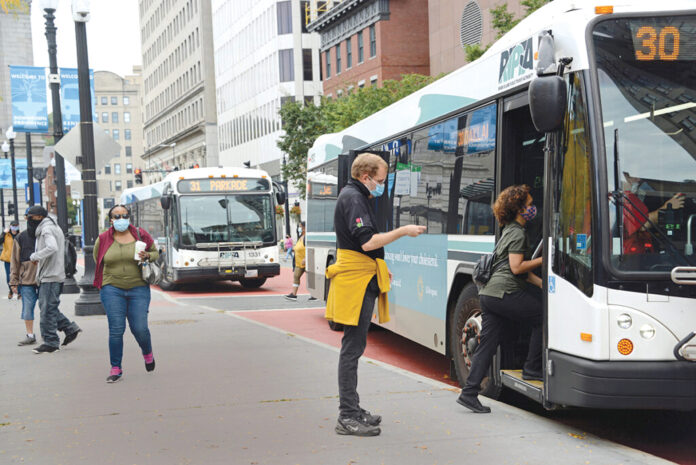
PROVIDENCE – Advocates are pressuring state leaders to put the pedal to the metal on expanding public transit and bicycle paths across the state.
Nearly two dozen people spoke during the open public comment period of a Transportation Advisory Committee meeting Thursday night, urging appointed panel members to take action.
The push comes nearly two years after state planning officials approved the two sets of long-range plans. The Transit Master Plan and Bicycle Mobility Plan each offer a set of policy changes and funding recommendations to improve upon and expand public transit and bicycle networks, respectively.
Yet some say these plans have done little more than collect dust in the two years since they were approved by the State Planning Council in December 2020, and they warn that further inaction risks major consequences for transportation, economic development and environmental mandates.
“If the TMP and the BMP are treated like chihuahuas just petted as cute things and not given the funding to get implemented, the results will be seriously missed opportunities,” Scott Wolf, executive director of Grow Smart RI, said during the Thursday meeting.
Wolf highlighted the importance of a more robust transit system – both bus and commuter rail – and bicycle network for the state’s economic development as well as its aggressive climate change mandates, such as reaching zero net carbon emissions by 2050.
Safety is also at the heart of both plans, safety that advocates say is much-needed based on the harrowing close-calls and accidents that cyclists and pedestrians recounted during the meeting.
Yet the state’s 10-year funding plan for transportation projects shows “little evidence” of the funds needed to make these plans happen, Wolf said.
The Transit Master Plan calls for doubling the operating budgets of the R.I. Public Transit Agency and the R.I. Department of Transportation to support its recommended projects, which include expanding the area and frequency of buses and trains, including a new electric light rail. Based on the $1.9 billion to $3.1 billion total cost (operating and capital), the plan estimates the average cost per year to be $94 million to $154 million, although much of this could be covered by federal matching funding.
The Bicycle Mobility Plan does not include a total cost but offers several suggestions for funding sources including the state transportation improvement budget, and a biennial $10 million bond to help pay for the hundreds of miles of new shared-use paths and buffered bicycle lanes.
Barry Schiller, a former member of the Transportation Advisory Board, said transit and bicycle projects have fallen by the wayside because the state continues to prioritize “auto-dependency” through expensive highway expansion projects.
Rep. David Morales, D-Providence, warned that without “initiative,” the same “countless cycles of highway expansion” will continue while the transit and bicycle plans become “outdated.”
The appeal to state transportation officials comes ahead of Gov. Daniel J. McKee’s proposed fiscal 2024 spending plan, expected to be released in January. By making their case now, advocates hope to ensure money for the transit and bicycle projects is included in the budget, said John Flaherty, deputy director for Grow Smart RI. Unprecedented federal funding for transportation projects, which often requires a state match, also makes this a good time for the state to commit money to bicycle and transit infrastructure, Flaherty said.
Matthew Sheaff, a spokesperson for McKee, disagreed that the state has let these plans lie dormant.
In an email on Friday, Sheaff pointed to “multiple projects” from these plans that have already received funding under the fiscal 2023 budget that started July 1, such as $14.5 million for a new Pawtucket/Central Falls train station and $20 million for bicycle and pedestrian path improvements.
Sheaff did not say how much the governor has included for expanded transit and bicycle access in his upcoming FY 2024 spending plan, but stated, “these projects are important to the administration and we look forward to continuing to move them forward.”
Meredith Brady, associate director for the R.I. Division of Planning, also said in comments during the meeting that there may be more discussion about these plans internally than the public knows, and that RIDOT and RIPTA are expected to share updates early next year.
Nancy Lavin is a PBN staff writer. Contact her at Lavin@PBN.com.













Expanding public transit makes sense.
Bike paths are a waste of taxpayer money. I’ve been riding a bike for over 60 years and I have managed quite nicely without bike paths, thank you very much. Real bike riders don’t need bike paths. If you need a bike path, you shouldn’t be on a bike.